After a divorce, even if it’s amicable, spouses usually give back the things that don’t belong to them and reclaim those that are theirs. This often includes last names, yet some spouses choose to keep their ex’s last name even after the divorce. In one small study, 17 of the 20 married women kept their former husband’s name after divorce.
But the wife in this story went even a step further. After cheating on her husband and marrying her affair partner, she decided to keep the ex’s last name. And in a cruel twist of faith, her new beau’s last name was the same as her ex’s first name. So, when both hyphenated their last names after the wedding, they became Mr. and Mrs. Ex’s Legal Name.
A man divorced his wife after she cheated with another man whose last name was the same as his first name

Image credit: cottonbro studio (not the actual photo)
Whether accidentally or on purpose, the couple hyphenated their last names and were now sporting the ex’s full legal name


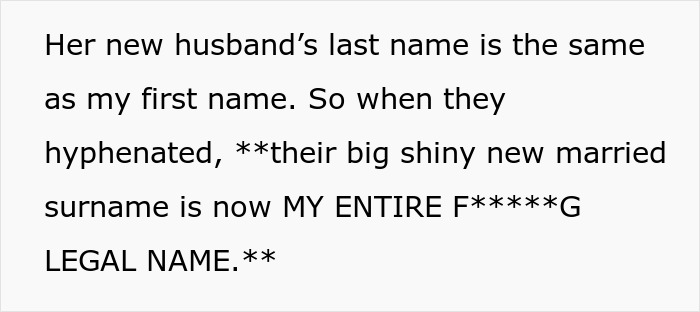


Image credit: YuriArcursPeopleimages (not the actual photo)
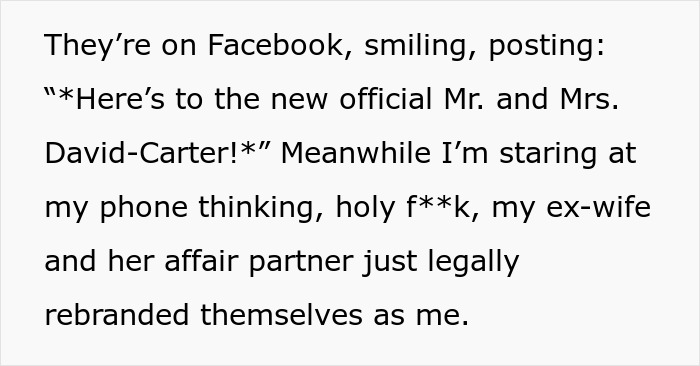


Image credit: Specken_zee_Doitch
Sometimes, keeping an ex-husband’s last name just might make a woman’s life simpler
A wife taking the husband’s last name is still tradition in the United States. According to a 2023 Pew Research Center survey, 79% of women in heterosexual marriages take their husband’s last name. 14% keep their last name and 5% hyphenate both names. In the UK, 90% of women adopt their husband’s surname upon getting married.
As cited above, it’s not that unusual for women to keep their husband’s last name after divorce. Legally, they can’t be forced to change their name back, as it’s a personal decision. Why would a woman see it as beneficial to keep her ex’s name even after she divorces him?
The reasons may be several:
- They see it as part of their identity now. When couples have been married for a long time, friends, family, coworkers, and the wife herself may get used to their current name. Reverting back to their maiden name might feel like losing a part of their identity.
- They just prefer the look and sound of the ex-husband’s last name more. Aside from aesthetic preference, their maiden name might bring up bad memories, especially if there has been family conflict in the past.
- It’s too much of a hassle. Changing back your name requires some paperwork. Women need to update their Social Security Cards, bank accounts, credit cards, and other identification documentation. That requires submitting a petition to the local court, which is quite time-consuming.
- It might affect their professional careers. Those who have established professional careers and reputations may choose to keep the last name to avoid losing recognition in their field.
- Parenting may become harder. The mom having a different last name from the rest of the family may confuse the kids. In interactions with schools, healthcare providers, and other institutions may require extra effort to identify both spouses as parents.
However, there’s one potential downside to which some commenters already alluded to: protecting their credit rating. When both exes have the same last name, they can take out joint credit agreements under the “family” name.
Some couples hyphenate each other’s last names to make the marriage a more equal partnership
This whole debacle makes one think: why do women still have to adopt their husband’s names in the U.S. in the year of our Lord 2025? In Hispanic America and some other Spanish-speaking countries, for example, a woman traditionally doesn’t replace her last names with her spouse’s. She carries both her father’s and mother’s surnames, and may add de (of) with the husband’s last name after the other two.
The tradition of a woman taking her husband’s last name when getting married goes back to the patriarchal societies of the Middle Ages. As the president of the Massachusetts Historical Society Catherine Allgor explained to Brides, it symbolized how the woman became her husband’s posession after matrimony.
The husband and wife become “one” after marriage, but, Allgor says, it wasn’t romantic. “The ‘one’ was the husband. She becomes, and this is the phrase, ‘legally [deceased].’ So it’s not that women take the last names of their husbands, which is how we think of it—it’s that they become part of [the husband’s] body. She does not exist in law, only the husband does.”
Today, like the couple in this story, some spouses may choose to combine each other’s last names to symbolize a more equal union. There are examples among celebrity couples, too: John and Yoko Ono Lennon, Sam and Aaron Taylor-Johnson, Brooklyn and Nicola Peltz Beckham, and Shawn (Jay-Z) and Beyoncé Knowles-Carter.
However, a new husband adopting the ex-husband’s last name isn’t that common and would probably be much harder to justify.
“They went with the order that matched my name,” the dumbfounded ex wrote
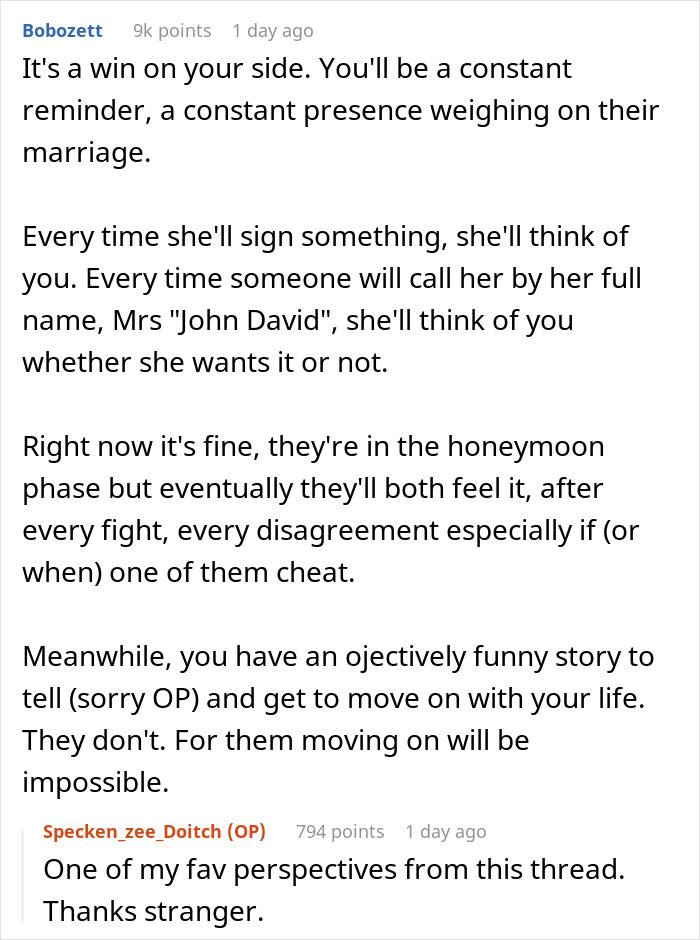

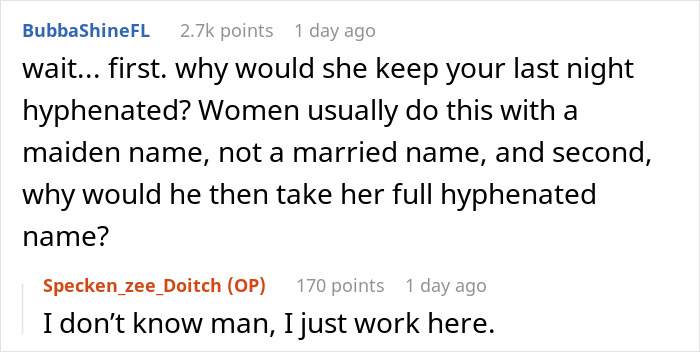
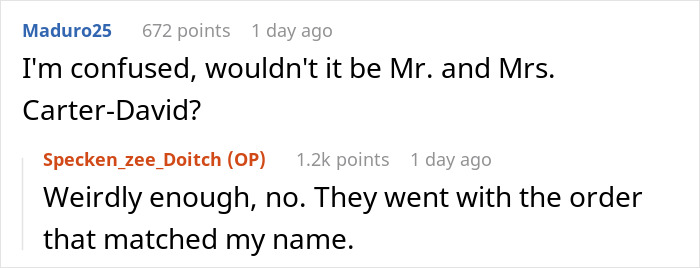





Some people suggested the ex should be petty about it, others advised to forget them and just live his life



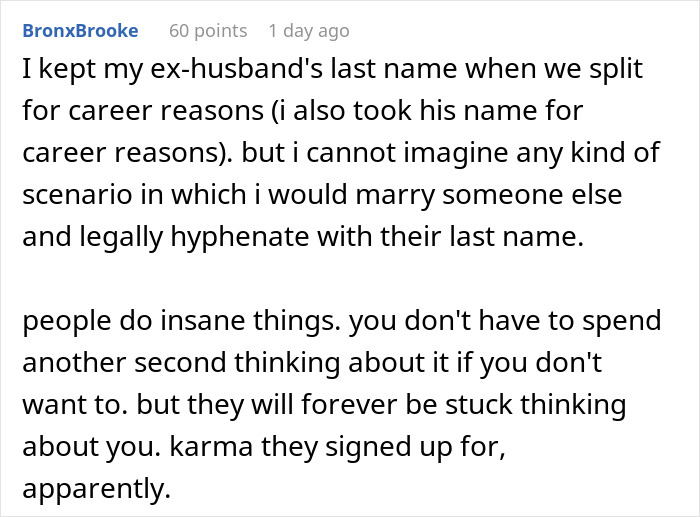





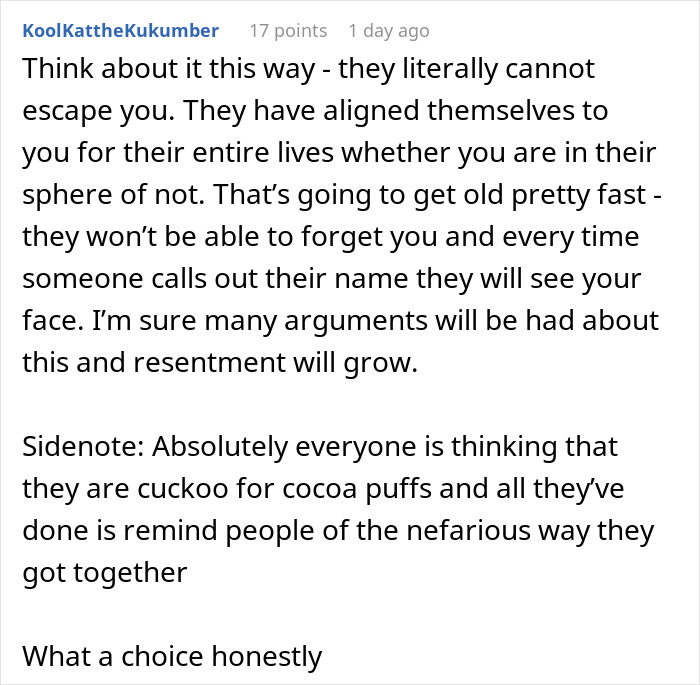








from Bored Panda https://ift.tt/1FbMAkc
via IFTTT source site : boredpanda